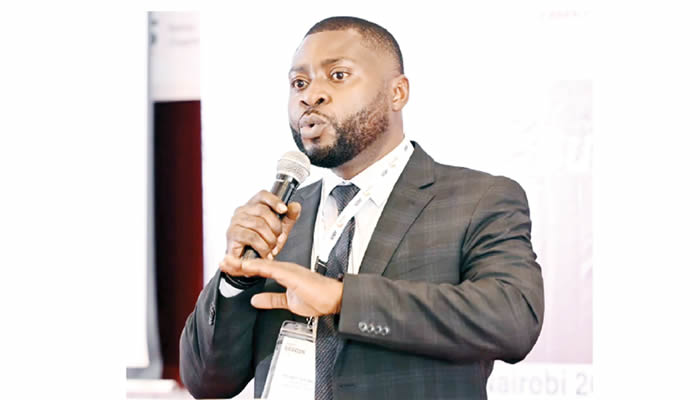Interviews
Power Woes Strain Security Firms – LEAD CEO
Published
7 months agoon

Security Expert Ifeanyi Obinali Discusses Launching a Security Firm in Nigeria and Industry Challenges
Ifeanyi Obinali, a seasoned security professional and the President/CEO of LEAD Security Group based in New York, as well as CEO of LISS-LEAD Integrated Security Solutions in Lagos, recently sat down with ANOZIE EGOLE to discuss the hurdles of operating a private security firm in Nigeria and his motivations behind the venture.
What motivated you to set up a security company in Nigeria?
After building a successful security enterprise in the United States and accumulating years of hands-on experience in security operations, I felt compelled to contribute to Nigeria’s safety sector. Since founding LEAD Security Group in New York in 2016, I’ve never lost sight of the fact that Nigeria is home. I saw a critical need for modern, dependable security services within the country, and I was determined to help fill that gap.
My exposure to effective strategies and advanced security frameworks abroad gave me the tools to make a meaningful difference. Establishing LISS-LEAD in Lagos was a way of giving back and actively participating in the effort to improve public and private safety across Nigeria.
Ifeanyi Obinali on the Future of Private Security in Nigeria and Overcoming Industry Challenges
Ifeanyi Obinali, CEO of LISS–LEAD Integrated Security Solutions in Lagos and President of LEAD Security Group in New York, discusses the vision behind his Nigerian security company, the sector’s economic impact, and how his firm is addressing operational and emerging security threats in an exclusive interview with ANOZIE EGOLE.
What is the long-term vision for your company in Nigeria?
Our ambition is to build a one-stop, full-spectrum security firm that delivers everything from manned guarding and executive protection to travel risk advisory and beyond. We’re not just here to provide services—we aim to raise the standards of the entire private security industry.
To achieve that, we’re actively engaging with state and federal authorities to push for strong, enforceable regulations that prioritize professionalism, accountability, and uniform standards. A core part of our strategy involves introducing specialized training and assessment protocols for security personnel to ensure they understand and uphold industry best practices. Taking a cue from regulatory models in the U.S., our goal is to address Nigeria’s existing gaps—such as poor oversight and inconsistent service quality—by elevating operational excellence across the board.
Do you believe private security firms are making a meaningful economic impact in Nigeria?
Absolutely. The private security sector contributes significantly to Nigeria’s economy on multiple fronts.
First, it’s a major employer. From security guards and surveillance officers to cybersecurity analysts and technicians, our industry offers livelihoods to thousands.
Second, by safeguarding businesses and public spaces, we create safer environments that encourage investment and support economic growth.
Third, private security companies also generate tax revenue and drive local economic activity through their operations. And in a country where the ratio of police officers to citizens is alarmingly low, private security providers help ease the pressure on overstretched public security forces, enabling them to focus on more serious national threats.
How do you integrate modern technology with traditional security measures?
We believe a robust security solution depends on a well-balanced fusion of technology and conventional techniques. It’s not a question of one replacing the other—it’s about synergy.
Our strategy blends high-tech tools with traditional practices to create multi-layered protection systems. This approach increases security effectiveness without compromising usability or human responsiveness. It’s a model designed for both resilience and efficiency.
What do you foresee for Nigeria’s private security sector in the next five years?
Our internal market review, conducted in August 2024, projects major growth and transformation for the industry by 2030.
With rising urban crime, political instability, terrorism, and frequent kidnappings, the demand for professional and reliable security services is increasing sharply. We anticipate a shift towards highly specialized, tech-enabled private security operations.
Artificial intelligence, surveillance drones, thermal imaging systems, AI-powered CCTV, and panic-alert technologies like geo-fenced alarm systems and barcode-based patrol verifications will redefine how security is delivered. These advancements, combined with traditional measures, are set to revolutionize the industry and vastly improve response capabilities.
ALSO READ : Abuja Pastors deny their churches and members after they were caught flouting the ban on religious gathering
What are the biggest operational challenges you’re currently facing?
Doing business in Nigeria comes with its own set of complex hurdles, quite different from operating in more developed environments like the U.S.
One persistent challenge is the unreliable power supply. For example, our Lekki office has been without grid electricity for almost four months. We’ve had to invest heavily in solar power and fuel-powered generators to stay operational, significantly driving up our costs and affecting profitability.
Additionally, inefficient bureaucratic systems, poor access to information, and non-functional communication lines with key government agencies mean we often have to rely on physical visits to get even basic tasks done. We also face the burden of inflation and high operational costs. Despite these setbacks, our commitment remains unwavering, and we continue to find innovative ways to sustain and grow our operations.
How is your firm addressing emerging threats like cybercrime and banditry?
We take a proactive, multi-pronged approach to emerging security risks such as cybercrime and banditry, which have become deeply embedded in socio-economic and political contexts in countries like Nigeria, Mexico, and Haiti.
Rather than waiting for incidents to occur, we focus on early identification, threat anticipation, and prevention. Our comprehensive strategy includes both physical and digital defences—secure locking systems, well-positioned lighting, advanced alarm technologies connected to our control centers, and more.
Moreover, we continually upskill our workforce. Training includes conflict de-escalation, crisis management, and tactical response, equipping our team to handle everything from cyber intrusions to on-the-ground threats. We believe preparation and continuous education are key to staying ahead in today’s fast-evolving security landscape.
Strengthening Private Security in Nigeria: A Conversation with Ifeanyi Obinali
Ifeanyi Obinali, CEO of LISS–LEAD Integrated Security Solutions, speaks on strategic collaboration with law enforcement, operational challenges, workforce development, and the evolving role of private security in Nigeria’s socio-economic landscape.
How important is collaboration with law enforcement in your operations?
Building strong ties with local law enforcement is a critical component of our operational model. Whenever we begin work in a new region, one of our first actions is to engage the local police station—introducing ourselves and informing them of our presence. This establishes a line of communication that ensures rapid support when needed.
Our security account managers are responsible for managing ongoing relationships with the police and other security stakeholders, while also educating our teams on how to effectively engage with authorities during emergencies. Additionally, we organise quarterly roundtable events that bring together senior executives, clients, account managers, and police representatives. These forums allow us to align our efforts and share strategies to enhance safety and operational efficiency in the communities we serve.
What steps can the government take to support private security companies in Nigeria?
Consistent power supply is foundational to business continuity, particularly in security operations that require constant monitoring and rapid response. The government must resolve inefficiencies within the electricity distribution companies (DisCos), which are charging for services they frequently fail to deliver.
Equally important is the need to streamline business regulations and remove bureaucratic bottlenecks. A transparent, corruption-free regulatory environment will benefit both domestic and international firms.
On the security front, the introduction of standardized testing and licensing for security officers is long overdue. A large segment of Nigeria’s security workforce lacks adequate training, which compromises effectiveness and professionalism. National guidelines on certification and conduct would enhance service quality and public trust.
How significant is the economic contribution of private security firms?
The private security sector is a vital pillar of Nigeria’s economy. It provides employment to over 100,000 individuals, ranging from guards and supervisors to cybersecurity personnel.
By protecting infrastructure, businesses, and individuals, security firms support investor confidence and economic development. They also alleviate pressure on public security agencies by filling critical gaps in areas where police resources are limited, allowing law enforcement to focus on national-level threats.
Are private security companies doing enough to address Nigeria’s security needs?
Private firms are playing a substantial role in maintaining safety across the country, but there is still room for improvement. Enhanced government support—particularly in areas like training, access to tools, and resource sharing—would greatly improve the industry’s effectiveness.
We also need stronger collaboration between private firms and public agencies. Unified efforts are key to developing sustainable and adaptive security solutions.
What percentage of private security companies in Nigeria do you believe are compliant with regulations?
It’s difficult to put a precise number on it, but compliance is an ongoing challenge. Regulatory agencies have a duty to enforce standards and ensure that all operators follow due process. Every company must secure proper licensing and fulfill all legal obligations before engaging in security work.
Furthermore, the Private Guard Companies Act of 1986 is outdated and doesn’t reflect today’s security realities. Modernisation of this legislation is essential for clearer compliance frameworks and to ensure that Nigeria’s private security industry can meet current and future challenges.
How compliant is your company with national regulations?
We maintain full compliance with all national security regulations and licensing requirements. To ensure our standards remain high, we work closely with a respected Lagos-based law firm that handles our legal, regulatory, and tax-related due diligence. This partnership keeps us aligned with evolving legislation and best practices.
How do you approach politically sensitive engagements as a security provider?
Private security plays a legitimate and valuable role in political events, particularly when it comes to crowd control, executive protection, and general order. Our teams are trained to manage event logistics, direct traffic, and maintain a peaceful environment.
However, we draw a firm line when it comes to controversy. We avoid any form of association with politically charged or ethically questionable actors. Our reputation is built on integrity and neutrality, and we strictly uphold the rule of law in all our engagements.
What do you look for in potential hires for your security team?
We prioritize experience and professional appearance. A candidate with a solid background in security can adapt quickly to our standards through focused training. Appearance is equally important, as a neat and confident presence helps overcome negative stereotypes and instills trust in clients and the public.
Beyond that, we look for candidates who are eager to learn, articulate, and comfortable in diverse scenarios. Security roles demand alertness, sound judgment, and clear communication—especially when handling sensitive situations or interacting with clients and the public.
How often do you retrain your staff?
Training is continuous at our firm. Before deployment, every team member undergoes role-specific onboarding tailored to client requirements and internal protocols. For guards stationed at client locations, we conduct quarterly retraining to sharpen their skills and keep them up to date on evolving threats.
Regular training reinforces our standards and ensures our personnel are fully prepared to respond effectively under any circumstances.
You Might Also Like These
 Oil firms gave ₦97B, $149M to host communities — NUPRC
Oil firms gave ₦97B, $149M to host communities — NUPRC
 Fashola faults FG on N213bn power intervention fund
Fashola faults FG on N213bn power intervention fund
 FG hands over PHCN to new investors, pays N360billion workers’ wages
FG hands over PHCN to new investors, pays N360billion workers’ wages
 FCT Bus Terminals Will Boost Security In Public Transportation – Tinubu
FCT Bus Terminals Will Boost Security In Public Transportation – Tinubu
 COVID-19 lockdown: Sanwo-Olu tasks security operatives on friendliness
COVID-19 lockdown: Sanwo-Olu tasks security operatives on friendliness
 Coronavirus: Buhari exempts some groups from ban on movement in Abuja, Lagos
Coronavirus: Buhari exempts some groups from ban on movement in Abuja, Lagos
 Local Government Elections: Police Enforce Movement Restrictions, Deploy Security Teams
Local Government Elections: Police Enforce Movement Restrictions, Deploy Security Teams
 I’m Not Involved With Sale of Power Company-First Lady
I’m Not Involved With Sale of Power Company-First Lady
 Coronavirus: Buhari orders total lockdown in Abuja, Lagos, Ogun
Coronavirus: Buhari orders total lockdown in Abuja, Lagos, Ogun
 Dangote Refinery to Commence Petrol, Diesel Distribution Nationwide
Dangote Refinery to Commence Petrol, Diesel Distribution Nationwide
 Ebem Ohafia incident: IGP sets up special probe panel, redeploys CP
Ebem Ohafia incident: IGP sets up special probe panel, redeploys CP
 Oil Marketers Reject Dangote’s Fuel Distribution Plan
Oil Marketers Reject Dangote’s Fuel Distribution Plan

